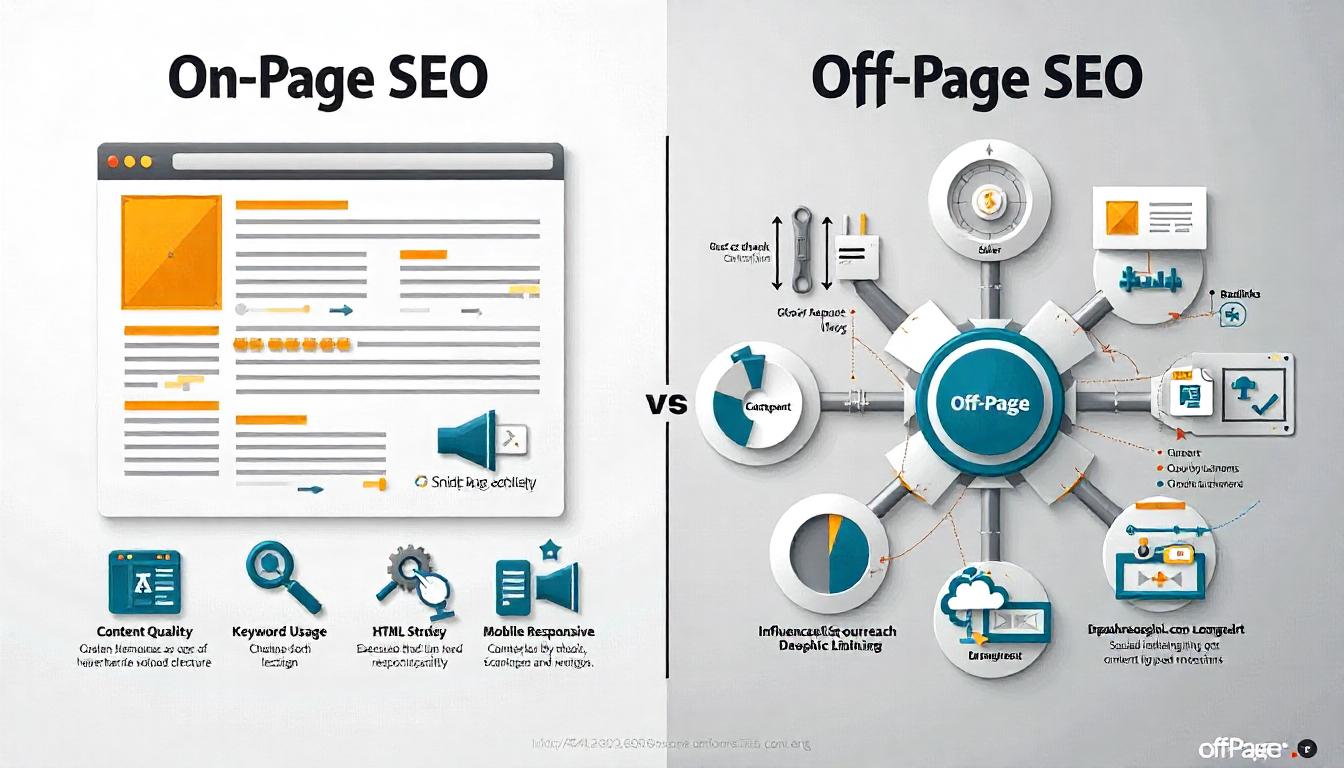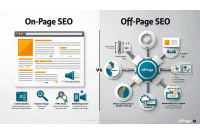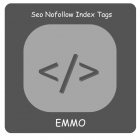The Differences Between On-Page and Off-Page SEO

The Differences Between On-Page and Off-Page SEO
Table of Contents
- Defining On-Page SEO: Key Elements and Techniques
- Defining Off-Page SEO: Key Strategies and Importance
- The Role of Content in On-Page SEO
- The Importance of Backlinks in Off-Page SEO
- How User Experience Influences On-Page SEO
- Social Signals and Their Impact on Off-Page SEO
- SEO Metrics: Measuring On-Page vs. Off-Page Success
- Integrating On-Page and Off-Page SEO for Optimal Results
Defining On-Page SEO: Key Elements and Techniques
On-page SEO refers to the optimization strategies applied directly to a website's pages to enhance its visibility in search engines. The primary goal of on-page SEO is to ensure that both search engines and users can easily understand and navigate a site. Key elements of on-page SEO include:
Content Quality: High-quality, informative, and engaging content is crucial. It should address user intent and provide value, whether through blog posts, product descriptions, or service pages.
Keyword Optimization: Identifying relevant keywords and strategically placing them throughout the content (in headings, paragraphs, and meta descriptions) helps search engines understand the page's subject matter.
HTML Tags: Utilizing title tags, header tags (H1, H2, etc.), and meta tags (meta descriptions and alt text for images) improves accessibility and gives search engines a clearer idea of the content hierarchy.
URL Structure: Clean, descriptive URLs that reflect the content make it easier for both users and search engines to understand the page's focus.
Internal Linking: Creating links within the site helps distribute page authority and guides users to related content, enhancing user engagement.
Mobile Responsiveness: With a significant portion of web traffic coming from mobile devices, having a responsive design ensures that users have a seamless experience across all devices.
Page Speed: Optimizing page load times improves user experience and is a ranking factor for search engines, as slower pages can lead to higher bounce rates.
Defining Off-Page SEO: Key Strategies and Importance
Off-page SEO encompasses all the optimization activities that occur outside of a website, aimed at increasing its authority, relevance, and trustworthiness in the eyes of search engines. Key strategies include:
Backlink Building: Gaining backlinks from reputable and relevant sites is crucial. Quality backlinks act as votes of confidence, signaling to search engines that your content is trustworthy and valuable.
Social Media Engagement: Promoting content through social media channels helps increase brand visibility and can drive traffic back to the website. Engagement on social platforms also contributes to brand authority.
Influencer Outreach: Collaborating with industry influencers can enhance credibility and widen reach. Influencers can help promote your content or products to their followers, driving traffic and potential backlinks.
Guest Blogging: Writing articles for other blogs within your niche allows you to build authority, gain backlinks, and reach new audiences.
Online Reputation Management: Maintaining a positive online presence through reviews, ratings, and mentions helps build trust. Responding to reviews, both positive and negative, can influence public perception.
Content Marketing: Creating shareable content (like infographics, videos, and articles) encourages others to link back to your site, improving authority and driving traffic.
Directory Listings: Submitting your site to reputable online directories can enhance visibility and provide quality backlinks.
Tip
If you offer your SEO texts in several languages or localize them for different regions, your pages may be incorrectly classified as duplicate content. However, there is a simple solution to this in the form of hreflang. Our article explains what you need to bear in mind when using hreflang.
Read more about hreflangThe Role of Content in On-Page SEO
Content is the cornerstone of on-page SEO. It encompasses all textual and visual elements on a webpage and directly influences how well a page ranks in search results. The effectiveness of content can be evaluated through several factors:
Relevance: Content should be closely aligned with user intent. Understanding the needs and questions of your target audience helps create material that answers their queries.
Keyword Integration: Keywords must be naturally integrated into the content to enhance relevance without compromising readability. Overusing keywords can lead to keyword stuffing, which can negatively impact SEO.
Content Structure: Well-organized content with clear headings, bullet points, and short paragraphs improves readability. This structure helps users find information quickly and encourages longer page visits.
Visual Elements: Images, videos, and infographics can enhance the user experience. Alt text for images is also crucial for SEO, as it provides context to search engines.
Freshness: Regularly updating content signals to search engines that the site is active and relevant. Refreshing old content can boost its visibility and performance.
The Importance of Backlinks in Off-Page SEO
Backlinks are critical to off-page SEO because they represent the number of external sites linking to your content. Search engines like Google consider backlinks a vote of confidence, which can significantly impact rankings. Key points about backlinks include:
Quality Over Quantity: It's more beneficial to have a few backlinks from high-authority sites than many from low-quality or spammy sites. Quality backlinks signal trust and credibility.
Diversity of Links: A natural backlink profile includes links from various sources—blogs, news sites, directories, and forums. This diversity helps build authority and mitigates risk from any single source.
Anchor Text: The clickable text of a backlink should be relevant to the linked content. Using descriptive anchor text helps search engines understand the context of the link and improves SEO.
Monitoring Backlinks: Regularly analyzing your backlink profile can help identify harmful links that may need to be disavowed to protect your site's authority.
How User Experience Influences On-Page SEO
User experience (UX) plays a pivotal role in on-page SEO. A positive user experience can lead to longer visits, lower bounce rates, and higher conversions, all of which signal quality to search engines. Key factors include:
Site Navigation: An intuitive, user-friendly navigation structure helps visitors find information easily, enhancing satisfaction and engagement.
Mobile Usability: As mobile browsing continues to rise, ensuring a mobile-friendly design is crucial for retaining users. Google prioritizes mobile-first indexing, which means sites optimized for mobile perform better in rankings.
Page Speed: Fast-loading pages provide a smoother experience. Tools like Google PageSpeed Insights can help identify issues slowing down your site.
Engagement Metrics: High click-through rates (CTR), time on page, and low bounce rates indicate that users find the content relevant and engaging. These metrics are essential for search engines when determining rankings.
Social Signals and Their Impact on Off-Page SEO
Social signals refer to the engagement that content receives across social media platforms. While social media metrics do not directly affect search rankings, they can influence off-page SEO in several ways:
Increased Visibility: Sharing content on social media platforms can drive traffic to your site, increasing exposure and the potential for backlinks.
Brand Authority: Active engagement on social media helps build brand recognition and authority. Brands perceived as reputable often attract more organic links and references.
User Engagement: Likes, shares, and comments can indicate content value to search engines. High engagement can signal to search engines that the content is relevant and worthy of higher rankings.
Influencer Collaborations: Sharing content through influencers can amplify reach and credibility, potentially leading to increased backlinks and traffic.
SEO Metrics: Measuring On-Page vs. Off-Page Success
Measuring the effectiveness of both on-page and off-page SEO strategies is essential for understanding performance and optimizing efforts. Key metrics include:
On-Page Metrics:
Organic Traffic: The number of visitors arriving through organic search results reflects the effectiveness of on-page optimization.
Bounce Rate: A high bounce rate may indicate that content isn’t engaging or relevant enough, necessitating adjustments.
Average Time on Page: Longer times suggest that users find the content valuable and engaging.
Off-Page Metrics:
Backlink Profile: Monitoring the number and quality of backlinks provides insights into authority and credibility.
Domain Authority (DA): A higher DA score indicates a stronger potential for ranking well in search results, influenced by both backlinks and on-page factors.
Social Shares: The number of times content is shared on social media can reflect its value and relevance, contributing to off-page authority.
Integrating On-Page and Off-Page SEO for Optimal Results
For a successful SEO strategy, it's vital to integrate both on-page and off-page efforts. This holistic approach ensures that all aspects of SEO work synergistically to enhance visibility and authority. Key strategies for integration include:
Content Promotion: Use high-quality on-page content as the foundation for off-page strategies. Promote engaging content through social media, guest posts, and influencer collaborations to build backlinks.
Consistent Branding: Maintain a consistent brand message across all platforms. A strong brand identity enhances trust and authority, making off-page efforts more effective.
Feedback Loop: Use data from both on-page and off-page metrics to inform strategy adjustments. For example, if certain content attracts backlinks, consider creating similar content to leverage that interest.
User-Centric Approach: Both on-page and off-page SEO should prioritize the user experience. Engaging content that meets user needs is more likely to attract shares and backlinks.
| The Differences Between On-Page and Off-Page SEO | |
|---|---|
| 1. Defining On-Page SEO: Key Elements and Techniques | On-page SEO involves optimizing individual web pages to improve search engine rankings and user experience. Key elements include content quality, keyword optimization, HTML tags, URL structure, internal linking, mobile responsiveness, and page speed. |
| 2. Defining Off-Page SEO: Key Strategies and Importance | Off-page SEO focuses on actions taken outside of your website to influence rankings, primarily through backlink building, social media engagement, influencer outreach, guest blogging, online reputation management, content marketing, and directory listings. |
| 3. The Role of Content in On-Page SEO | Content is central to on-page SEO, affecting relevance and engagement. It should be high-quality, keyword-optimized, well-structured, visually engaging, and regularly updated to meet user needs and improve rankings. |
| 4. The Importance of Backlinks in Off-Page SEO | Backlinks are vital for off-page SEO, acting as votes of confidence from other websites. Quality over quantity is essential, as diverse and relevant backlinks enhance a site’s authority and search visibility. |
| 5. How User Experience Influences On-Page SEO | User experience impacts on-page SEO by affecting engagement metrics. Factors like site navigation, mobile usability, page speed, and content readability all contribute to how users interact with a site, influencing search rankings. |
| 6. Social Signals and Their Impact on Off-Page SEO | Social signals, such as likes, shares, and comments on social media, enhance visibility and brand authority, indirectly affecting search rankings. High engagement on social platforms can lead to increased backlinks and traffic. |
| 7. SEO Metrics: Measuring On-Page vs. Off-Page Success | Measuring success involves analyzing metrics for both on-page and off-page efforts. For on-page, focus on organic traffic, bounce rates, and time on page; for off-page, track backlinks, domain authority, and social shares. |
| 8. Integrating On-Page and Off-Page SEO for Optimal Results | A successful SEO strategy integrates both on-page and off-page efforts, promoting high-quality content through various channels, maintaining consistent branding, and focusing on user experience to enhance overall visibility and authority. |
FAQs
What is On-Page SEO?
On-Page SEO refers to the optimization techniques applied directly to a website's pages to improve its visibility in search engines. It includes elements such as content quality, keyword optimization, HTML tags, URL structure, internal linking, mobile responsiveness, and page speed, all aimed at enhancing user experience and search engine understanding.
What Are the Key Elements of On-Page SEO?
The key elements of On-Page SEO include:
- Content Quality: High-quality, informative, and engaging content that addresses user intent.
- Keyword Optimization: Identifying and placing relevant keywords throughout the content.
- HTML Tags: Using title tags, header tags, and meta tags to improve accessibility.
- URL Structure: Clean and descriptive URLs that reflect the content.
- Internal Linking: Creating links within the site to guide users and distribute authority.
- Mobile Responsiveness: Ensuring a seamless experience across all devices.
- Page Speed: Optimizing load times to enhance user experience.
What is Off-Page SEO?
Off-Page SEO involves optimization activities that occur outside of a website, aimed at increasing its authority, relevance, and trustworthiness. It includes strategies like backlink building, social media engagement, influencer outreach, guest blogging, online reputation management, content marketing, and directory listings.
Why Are Backlinks Important in Off-Page SEO?
Backlinks are critical in off-page SEO as they act as votes of confidence from other websites. Quality backlinks from reputable sites enhance your site's authority and can significantly impact search rankings. It's essential to focus on obtaining high-quality backlinks rather than a large quantity of low-quality links.
How Does User Experience Affect On-Page SEO?
User experience (UX) plays a pivotal role in on-page SEO. A positive UX can lead to longer visits, lower bounce rates, and higher conversions, which signal quality to search engines. Key factors affecting UX include intuitive navigation, mobile usability, page speed, and engagement metrics.
What Are Social Signals and Their Impact on Off-Page SEO?
Social signals refer to the engagement that content receives on social media platforms. While they don't directly affect search rankings, they can influence off-page SEO by increasing visibility, building brand authority, enhancing user engagement, and leading to potential backlinks through influencer collaborations.
How Can I Measure the Success of On-Page and Off-Page SEO?
To measure the effectiveness of both on-page and off-page SEO strategies, key metrics include:
- On-Page Metrics: Organic traffic, bounce rate, average time on page.
- Off-Page Metrics: Backlink profile, domain authority (DA), social shares.
How Can I Integrate On-Page and Off-Page SEO for Optimal Results?
Integrating on-page and off-page SEO involves promoting high-quality on-page content through social media, guest posts, and influencer collaborations. Maintaining consistent branding across platforms and using feedback from both on-page and off-page metrics can help optimize your SEO strategy for better visibility and authority.










